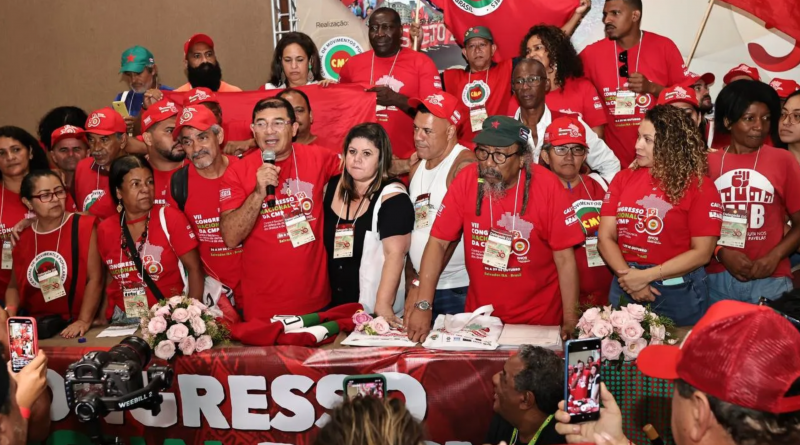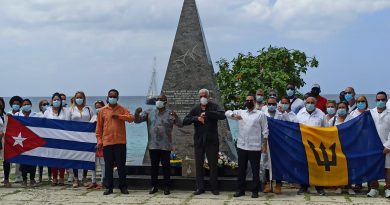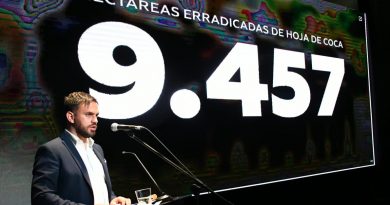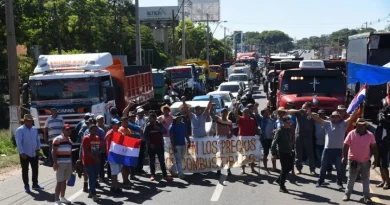How to prevent the fascists from coming back
Frei Betto’s opening speech at the Brazil’s 7th Congress of the Central de Movimentos Populares
By Brian Mier
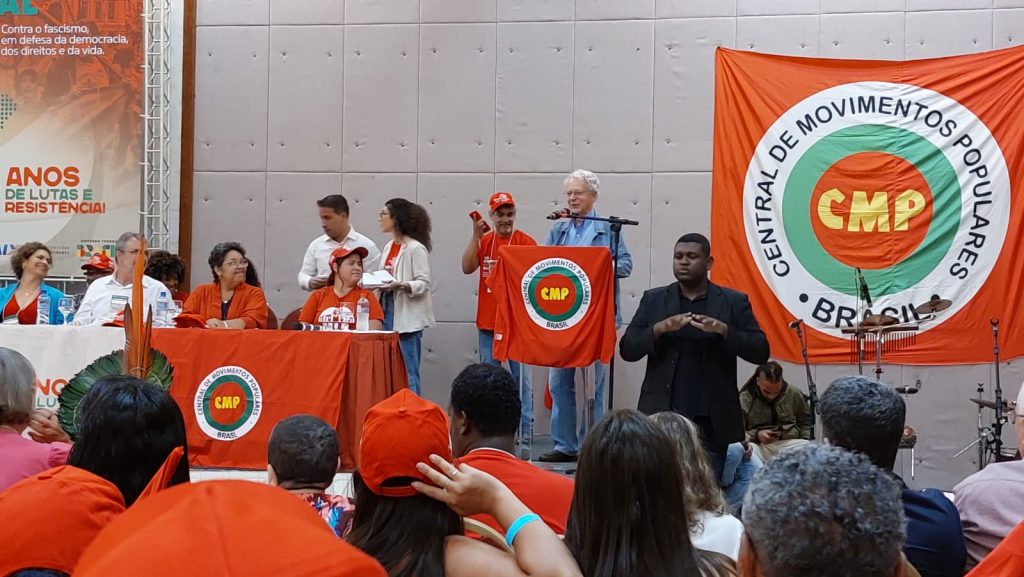
During the opening ceremony Frei Betto the 79-year-old liberation theologian and original founder of the Workers Party and the CMP, gave the following speech, which has been transcribed and edited for readability.
I am thrilled to be here with you tonight celebrating 30 years of the Central de Movimentos Populares. I’d like to say hello to [Bahia] Governor Geronimo Rodrigues and his comrade Tatiana. I’d also like to say hello the the 3 Federal Ministers who are here, with whom I have certain experiences. I am involved in a conspiracy with [General Secretary of the Presidency] Marcio Macedo to mobilize the popular social movements more and more in this country. Cida [Gonçalves] is one of the few founders of the Central de Movimentos Populares here – she’s brave, persistent and hopeful – and today she’s a Minister. I never even made it to the post of Minister of Hunger. And here is Cida, our Minister of Women’s Rights. And there’s Paulo Texeira [Minister of Agrarian Development] – where’s Paulo? There he is sitting next to Cida. He’s another comrade whose taken part in many of the social movement’s struggles and also in the [Catholic Liberation Theology] pastoral organizations. And we have our conspiracies together these days too.
I’d like to tell you a quick story. In January, 1980, I was invited to the inauguration of [Metalworkers Union President] João Paulo Pires Vasconcelos, in João Monlevade, Minas Gerais. There were lots of union leaders there, including Luiz Inacio Lula da Silva. I was already working in the Labor Pastoral in São Paulo’s ABC region but I only first met Lula in João Monelvade. We spoke together over lunch that day. I said, “Lula, I am very worried about the founding of PT [Partido dos Trablhadores/the Workers Party] that is taking place in a few days.” It was the third week of January. PT was officially founded on February 10, 1980.
“Why are you worried?” he asked.
I said, “I’m worried about the following: During these years of struggle against the dictatorship,we have built an incredible range of popular [“peoples” or “working class”] social movements. The union movement expelled the sell-outs from its ranks. The opposition unions have become more combatant. You yourself said this is the fruit of the fighting spirit that the union movement has recuperated from 1975 forwards. There are also Ecclesiastic Base Communities spread throughout the entire country. I am worried that if we found this party like a drain pipe that sucks down all the water, all of this wealth of popular social movements will be swallowed up.”
Comrade Lula said, “You have a good point. And we have to do something urgently to prevent this from happening.”
Why was this important? Because the more that we have a diversity of popular social movements, political parties, pastorals, environmental and identitarian movements, as we do today, the more power we will have and this will enable us to achieve our victories faster.
So we came up with the idea to hold a meeting with popular social movement and union leaders in São Bernardo do Campo the next week. But because of the dictatorship – I’m talking about 1980 and the dictatorship only ended in 1985 – we ended up having to hold this meeting in Taboão da Serra [São Paulo]. It was highly representative and it was tense, because the repressive government forces could have arrested us all there at any moment. There, we drafted a document called the São Bernardo Statement, in honor of São Bernardo – we were unable to meet there but we named the statement after it. Raimundo [current CMP President] was there, right? Raimundo participated. He’s another original founder of the Central de Movimentos Populares and a great motivating force to this day, fortunately. Ze Albino was there too. Is he here today? Where is he? [points] Hey, Ze Albino is here discretely. He deserves our applause.
At this meeting we decided to form ANAMPOS. ANAMPOS is the mother of CUT [Central Única dos Trabalhadores/Unified Workers Central union federation] and the mother of the CMP. ANAMPOS stood for the National Articulation of Popular Social and Labor Movements.
We organized and held a Congress in Praia Grande [São Paulo] . There was a division inside the union movement there and they decided to create the CUT, whose first Congress and founding act took place in São Bernardo do Campo [São Paulo] in the old Veracruz movie studio. It was ANAMPOS that created the conditions for holding the first CUT Congress. So ANAMPOS holds this double honor of giving birth to two important children in the history of our country – the CUT and the CMP.
ANAMPOS continued for another 10 years. We chanted the “S” for sindicais (unions) for the plural “S” in “populares”, forming the Articulacao Nacional de Movimentos Populares (National Articulation of Popular Movements) and in 1993 in Belo Horizonte, we founded the Central de Movimentos Populares which, thanks to you, is alive, fighting, combative, and very ideologically consistent.
But the current conjuncture is very worrying. And this is what I want to spend the rest of my speech talking about, as a contribution to this Congress which will continue until Sunday. I can’t stay here for the whole thing but I want to make this quick contribution.
I will cite two troubling examples that come up when we talk about popular victories. First, the example of a country that had 70 years of socialism. 70 years, with the highest quality of social policies – education, full employment, high quality public health – and excellent technological innovation as the first country to put a human being in space, Yuri Gagarin. I’m talking about the Soviet Union. 70 years of high quality social policies. It fell without anyone having to fire a single bullet. It went under. So we have to ask what went wrong for capitalism to have taken hold in Russia and the countries that made up the former Soviet Union.
The second example is of 2 Brazilian cities that were very well run by the PT for 4 consecutive mandates: Marica in Rio de Janeiro and Ipatinga in Minas Gerais. During the last municipal elections [in 2020] Bolsonaro’s candidates won in the first and second rounds.
Do you know how we failed? Social policies are fundamental to reduce social inequality, to liberate people from their chains of submission and prejudice, discrimination and social exclusion. But they are not enough to change people’s hearts and minds. Either – starting with our own social movements – we engage in intense political education work, either we yank Paulo Freire off the shelf and put his ideas in practice or the right is going to return to power.
This is the problem. They are going to come back if we aren’t able to plant another political perspective in the hearts and minds of the Brazilian people, another critical vision of society – a struggle that connects all of these different identitarian and environmental struggles with the class struggle. Of building a socialist society, a society where our constant refrain that the problem of racism and misogyny are structural problems is actually addressed. We need policies that change these structures. For this we need consciousness raising, organizing and mobilization. Why? Because the Brazilian people suffer 24 hours per day from an intense process of political miseducation. All you have to do is turn on a TV, radio, or turn on a smartphone and open the digital networks to see this. Capitalism has an enormous advantage because we live inside of it and it is extremely powerful. But it’s not powerful enough to prevent changes in the course of history, as history itself demonstrates. So it is very important that we make a commitment to transform our movements into schools, centers and nuclei of intense political education and training for young activists. Because a government like that of comrade Lula will only stay in power if it walks on two legs. One of it’s legs is called the National Congress and the other is called popular mobilization. President Lula is tying a knot in a drop of water trying to govern with this Congress where the majority is against him. It’s against the political proposal that all of us here defend. Now imagine if we had the power to stage big popular mobilizations. Imagine if we had the power to but a lot of people onto the streets of Brazil to defend this government’s agenda. He wouldn’t have to make a single concession to Congress. Not one. This is the challenge. This is the birthday present that we should give comrade Lula tomorrow. Let’s engage in political education to raise consciousness, mobilize and organize our people. Viva the Central de Movimentos Populares! Viva Brazil!
By Brian Mier, published on De-Linking Brazil
